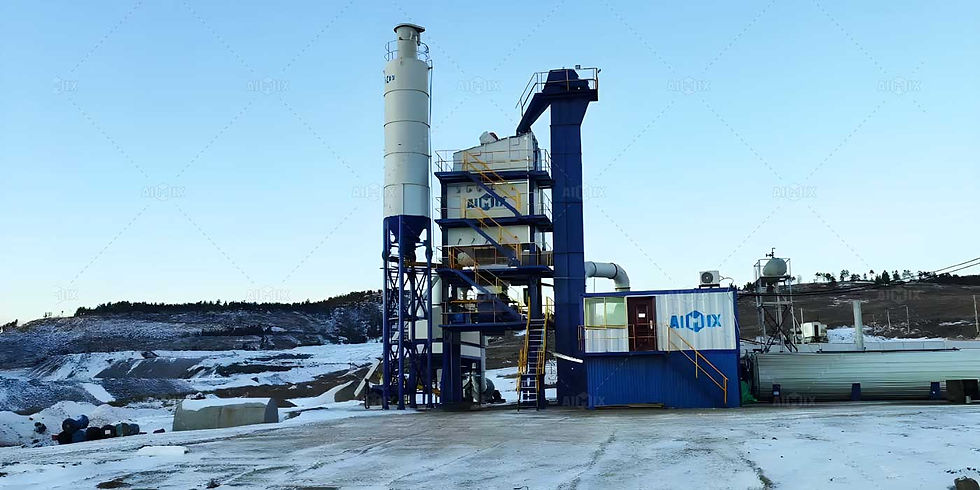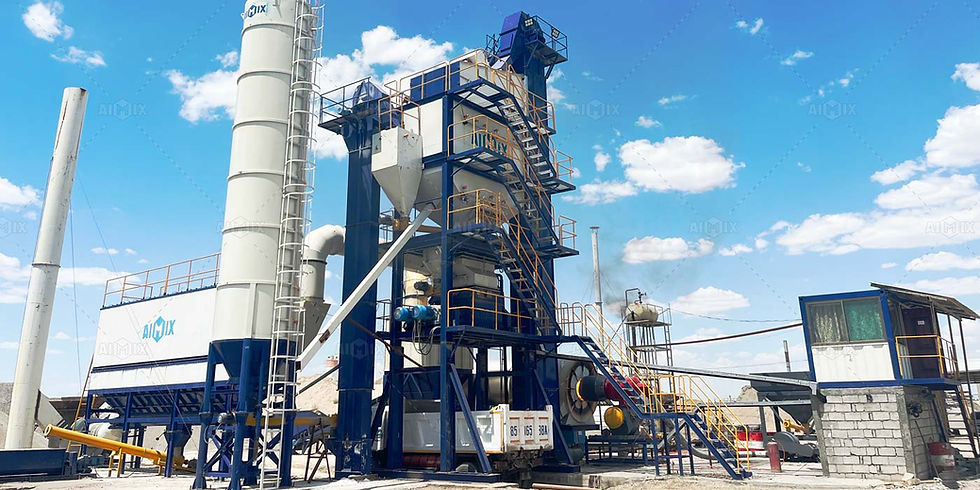How Many TPH Asphalt Plant Do I Need If I Plan To Pave 500 Tons Of Asphalt Daily For National Road Upgrading?
- aimixglobal5
- Jun 15, 2025
- 3 min read
When planning a national road upgrading project, one of the first questions contractors face is: what size asphalt plant do I really need? If your target is to pave 500 tons of asphalt mix per day, choosing the right asphalt plant capacity is crucial for both efficiency and cost control. In this article, I will walk you through the calculation, key considerations, and practical solutions to help you select the right asphalt mixing plant for your project.

Understanding The Daily Asphalt Production Target
Before deciding on the asphalt plant capacity, you need to translate your daily paving target into hourly production capacity. Since you plan to pave 500 tons of asphalt daily, let’s start from there.
Typically, asphalt paving operations do not run 24 hours continuously. Most national road upgrading projects operate about 8-10 hours per day due to daylight, manpower shifts, and logistical constraints. For calculation, let's assume 10 working hours per day, which is quite common for national road projects.
Now, divide the daily target by the working hours:
500 tons ÷ 10 hours = 50 tons per hour (TPH)
This means your asphalt mixing plant mini needs to produce at least 50 TPH to meet your daily target comfortably. However, this is only the theoretical minimum. In practice, you need to consider several other factors before finalizing your plant size.
Why You Should Choose A Slightly Higher Capacity
Although 50 TPH meets your calculation, running your asphalt plant at full capacity all the time is not ideal. There are multiple reasons to select a plant with a buffer:
Unplanned Downtime: Equipment maintenance, weather interruptions, or material delays may affect production. A higher capacity allows you to catch up when needed.
Material Quality Control: Operating slightly below maximum load ensures better temperature control and more consistent asphalt quality.
Future Expansion: If you plan to take additional projects or face increased workload, your plant should handle extra demand.
Therefore, many contractors targeting 500 tons per day often select a 60-80 TPH asphalt plant to maintain production flexibility and product quality.

Which Type Of Asphalt Plant Fits National Road Upgrading Projects?
Once you estimate the capacity, the next step is choosing the right type of asphalt plant. The main options include:
Batch Mix Asphalt Plant
Batch plants offer precise control of mix quality. They are widely used for national road projects where strict specifications apply. A 60-80 TPH asphalt batch plant for sale would fit your daily target while delivering consistent asphalt mixtures.
Drum Mix Asphalt Plant
Drum mix plants provide continuous production, lower initial investment, and simpler operation. For national road upgrading, a 60-80 TPH drum plant can efficiently meet your target if the project specifications allow continuous mix designs.
Mobile Asphalt Plant
When the project involves multiple sections or remote areas, a mobile plant becomes highly practical. It reduces transportation time and costs. Mobile plants with 60-80 TPH output are commonly used in national road upgrading contracts across many developing regions.
Other Practical Factors To Consider
While capacity is the starting point, several additional factors influence your final decision:
Project Location: Remote locations may favor mobile plants for faster site relocation.
Aggregate Supply: Steady supply of aggregates, bitumen, and fillers is essential to avoid plant stoppages.
Climate Conditions: High humidity or rainfall may require better drying and heating systems.
Local Regulations: Environmental standards may affect burner selection and dust collection systems.
Balancing all these factors will help you choose the most suitable asphalt mixing solution for your national road upgrading project.

Cost Efficiency And Long-Term Value
Choosing the right asphalt plant size not only ensures production but also controls your overall cost. A plant that is too small will delay project completion, increase labor, and cause material waste. On the other hand, an oversized plant raises your initial investment and operational costs unnecessarily.
By targeting 60-80 TPH capacity for your 500-ton daily production, you strike a balance between operational flexibility, mix quality, fuel efficiency, and future project scalability.
Our Asphalt Mixing Solutions Tailored For National Road Projects
With years of experience serving national road upgrading projects, we offer a full range of asphalt mixing plants from 40 TPH to 160 TPH. Whether you need a stationary batch plant for high-precision mixes, a drum plant for cost-effective production, or a mobile asphalt plant for remote projects, we can design a solution that fits your real needs.
Our team supports you not only in equipment supply but also in layout design, logistics planning, installation, and training. We understand that every road project is unique, and we are ready to help you maximize productivity and profitability.

Contact Us To Start Your Asphalt Plant Consultation
Choosing the right asphalt plant capacity is a key step to ensuring your national road upgrading project runs smoothly. If you are unsure which TPH plant suits your situation, we are here to help. Contact us today to get personalized advice, customized solutions, and competitive offers. Let’s build better roads together!



Comments